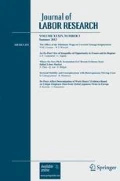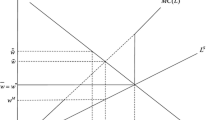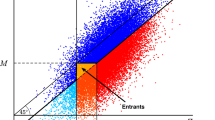Abstract
The Wessels model suggests that firms respond to increases in the minimum wage rate by decreasing the level of fringe benefits — an action which produces an inefficiency effect that lowers workers’ utility and the supply of labor. Standard models of monopsony, however, argue that wage floors prevent the exercise of market power and increase employment. I show that wage floors, even with fringe benefit curtailment, may increase employment by lowering the marginal expense of labor. Employee utility and employment will rise somewhat but not as much had the firm acted competitively in setting both wages and fringes.
Similar content being viewed by others
References
Ferguson, C. E.The Neoclassical Theory of Production and Distribution. New York: Cambridge University Press, 1969.
McClure, J. Harold, Jr. “The Wessels Effect with Heterogeneous Workers: The Minimum Wage Has Winners As Well As Losers.” Villanova University Working Paper, 1992.
McKensie, Richard B., and Gordon Tullock. “The Minimum Wage: A New Perspective on an Old Policy.” InThe Best of the New World of Economics, 5th ed., Homewood, Ill.: Richard D. Irwin, 1989.
Samuelson, Paul A.Foundations of Economic Analysis. Cambridge, Mass.: Harvard University Press, 1947.
Varian, Hal R.Microeconomic Analysis. New York: W. W. Norton, 1992.
Wessels, Walter.Minimum Wages, Fringe Benefits, and Working Conditions. Washington, D.C.: American Enterprise Institute for Public Policy Research, 1980a.
_____. “The Effect of Minimum Wages in the Presence of Fringe Benefits: An Expanded Model.”Economic Inquiry 18 (April 1980): 293–313.
Zucker, Albert. “Minimum Wages and the Long-Run Elasticity of Demand for Demand for Low Wage Labor.”Quarterly Journal of Economics 87 (May 1973): 267–77.
Author information
Authors and Affiliations
Rights and permissions
About this article
Cite this article
McClure, J.H. Minimum wages and the wessels effect in a monopsony model. Journal of Labor Research 15, 271–282 (1994). https://doi.org/10.1007/BF02685770
Issue Date:
DOI: https://doi.org/10.1007/BF02685770




